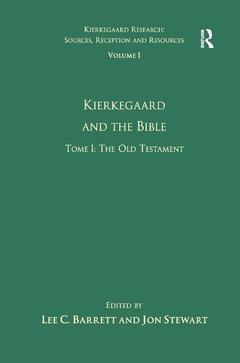Description
Volume 1, Tome I: Kierkegaard and the Bible - The Old Testament
Kierkegaard Research: Sources, Reception and Resources Series
Author: Stewart Jon
Coordinator: Barrett Lee C.
Language: English
Subjects for Volume 1, Tome I: Kierkegaard and the Bible - The Old...:
Keywords
Bibel Alten Und Neuen Testamentes; upbuilding; Young Man; discourse; Upbuilding Discourses; bibel; Die Bibel Alten Und Neuen; alten; Kierkegaard; und; De Silentio; neuen; EUD; testamentes; Spekulative Theologie; wilhelm; De Wette; martin; Follow; leberecht; Frater Taciturnus; Nineteenth Century Denmark; EPW; Golden Age Copenhagen; Kierkegaard Research; Testament Story; SLW; Das Alte Testament; Personae; Solomon’s Dream; Felix Culpa; Jacob’s Struggle; Apocryphal Books; Flyvende Post; Johannes De Silentio
Publication date: 06-2010
Support: Print on demand
Publication date: 10-2016
· 15.6x23.4 cm · Paperback
Description
/li>Contents
/li>Biography
/li>




